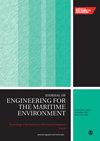船用双燃料发动机ORC系统的热经济性优化
IF 1.5
4区 工程技术
Q3 ENGINEERING, MARINE
Proceedings of the Institution of Mechanical Engineers, Part M: Journal of Engineering for the Maritime Environment
Pub Date : 2023-11-14
DOI:10.1177/14750902231207128
引用次数: 0
摘要
有机朗肯循环(ORC)是最有前途的回收内燃机余热的系统之一。本文针对某双燃料船用发动机与废气再循环(EGR)系统集成,对基于有机朗肯循环的清风冷却水余热回收系统(WHRS)进行了热力学、经济和环境分析。零臭氧消耗和低全球变暖潜能值的工作流体;选用来自氢氟烃的R245fa、R236ea、来自碳氢化合物的R600a、R601a、来自氢氟烯烃的R1234ze和R1234yf作为低品位WHRS。除了热分析外,还评估了系统的质量和体积以及工作流体的安全系数,以判断系统在船舶上的物理适用性。通过分析、优化和比较不同发动机载荷、Tier II和Tier III模式下液体的热经济性能,揭示不同发动机工况对参数的影响。结果表明,在中、重载工况下,后置空气产生了大量的余热,发动机模式的切换对后置空气的性能有显著影响。R601a表现出最好的热经济性能,然而,考虑到系统的适用性,R236ea是最适合ORC WHRS的工作流体。发电系统的整体热效率可提高2.8%左右。本文章由计算机程序翻译,如有差异,请以英文原文为准。
Thermo-economic optimization of an ORC system for a dual-fuel marine engine
The Organic Rankine Cycle (ORC) is one of the most promising systems to recover the waste heat sourced from internal combustion engines. In this study, thermodynamic, economic and environmental analyses of the scavenge air cooling water-driven Waste Heat Recovery System (WHRS) based on the organic Rankine cycle are conducted for a dual-fuel marine engine integrated with exhaust gas recirculation (EGR) system. Zero ozone-depleting and low global warming potential working fluids; R245fa, R236ea from hydrofluorocarbons, R600a, R601a from hydrocarbons, R1234ze and R1234yf from hydrofluoroolefins are selected for the low-grade WHRS. In addition to the thermal analyses, the mass and volume of the system along with the safety factors of the working fluids are evaluated to judge the physical applicability of the system for ships. Thermo-economic performances of the fluids are analyzed, optimized and compared under various engine loads, Tier II and Tier III modes to reveal the effects of different engine operating conditions on the parameters. According to the results, scavenge air has a significant amount of waste heat at medium and heavy loads and switching the engine mode remarkably affects the performance of the WHRS. R601a shows the best thermo-economic performance, however, considering the applicability of the system R236ea is the most suitable working fluid for the ORC WHRS. The overall thermal efficiency of the power generation system can be increased by about 2.8%.
求助全文
通过发布文献求助,成功后即可免费获取论文全文。
去求助
来源期刊

CiteScore
3.90
自引率
11.10%
发文量
77
审稿时长
>12 weeks
期刊介绍:
The Journal of Engineering for the Maritime Environment is concerned with the design, production and operation of engineering artefacts for the maritime environment. The journal straddles the traditional boundaries of naval architecture, marine engineering, offshore/ocean engineering, coastal engineering and port engineering.
 求助内容:
求助内容: 应助结果提醒方式:
应助结果提醒方式:


